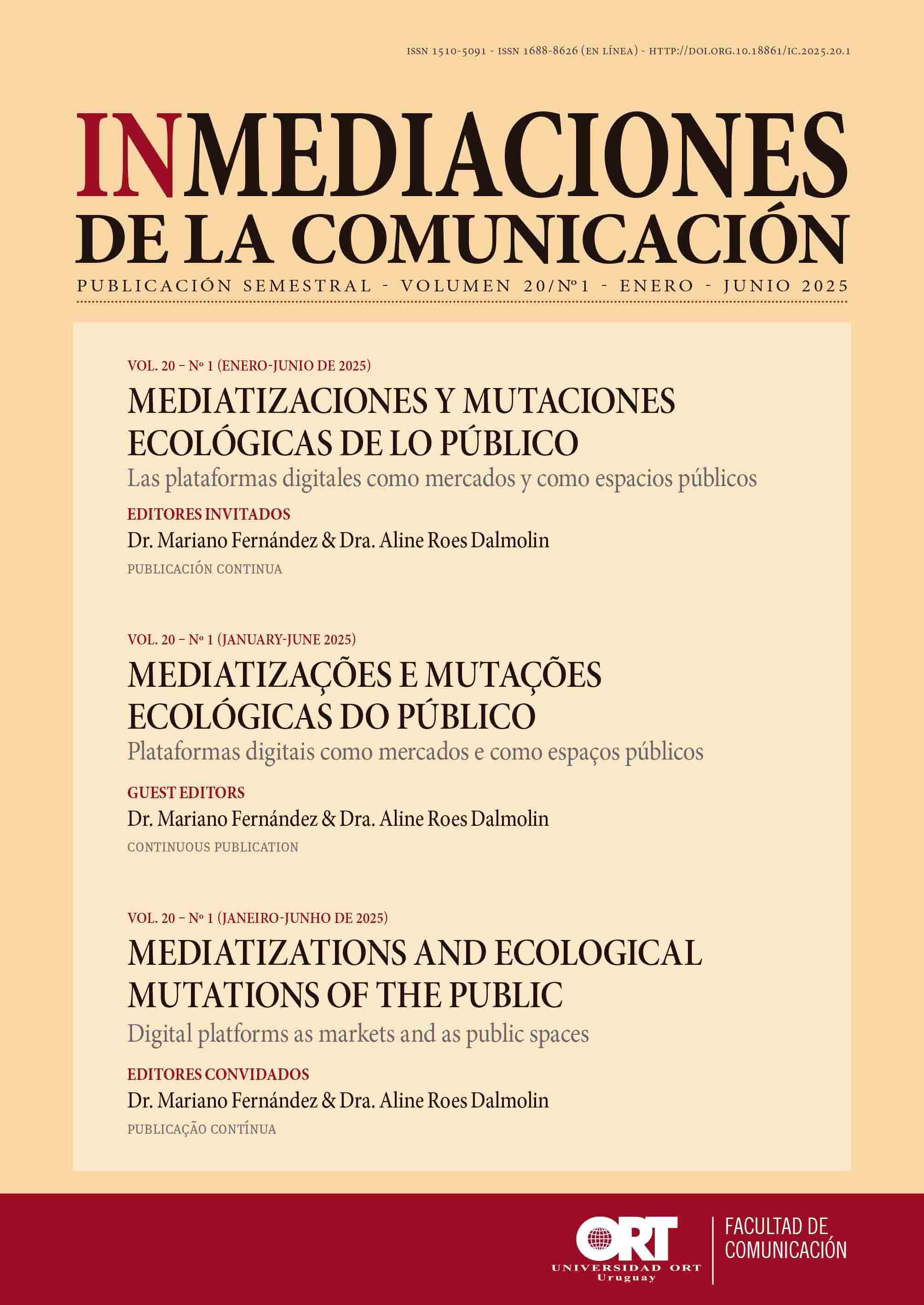Generative Artificial Intelligence integrated into the Digital Ecosystem
A framework for Algorithmic Governmentality
DOI:
https://doi.org/10.18861/ic.2025.20.1.3931Keywords:
artificial intelligence, LLMs, algorithmic governmentality, platforms, epistemic bubblesAbstract
This article analyzes the advancement of the integration of Generative Artificial Intelligences into platforms, especially those based on Large Language Models (LLMs). These changes are beginning to alter the way content is produced and used, information is searched and processed, and user profiles are managed. The aim of the article is to map the main LLM developments in the West and their strategic, hardware supply or financial partnerships with cloud computing platforms, hardware producers and servers. In this sense, we start with the massive launch of ChatGPT as the founding moment of this new stage and go through the main uses and applications of transformers in platform environments. Although we are at the beginning of the application of this technology in an integrated manner, it could generate a deepening of algorithmic personalization, modifying the forms of human subjectivation and favoring epistemic bubbles at the cognitive level, as well as concentrating supply and development at the level of political economy. That is why it is necessary to seek more forms of human intervention in data curation and to increase the active observance –both civil and governmental– of these systems and their alliances in order to avoid extreme concentration and to attend to the biases that could generate negative effects on culture.
Downloads
References
An, L., Quercia, D. & Crowcroft, J. (2014). Partisan sharing: Facebook evidence and societal consequences. Proceedings of the Second ACM Conference on Online Social Networks, 13-24. https://dl.acm.org/doi/abs/10.1145/2660460.2660469
Bala, M. & Verma, D. (2018). A Critical Review of Digital Marketing. International Journal of Management, IT & Engineering, 8(10), 321-339. https://papers.ssrn.com/sol3/papers.cfm?abstract_id=3545505
Bender, E., Gebru, T., McMillan-Major, A. & Mitchell, M. (2021). On the Dangers of Stochastic Parrots: Can Language Models Be Too Big? Conference on Fairness, Accountability and Transparency, 610-623. https://doi.org/10.1145/3442188.3445922
Bratton, B. H. (2016). The stack: On software and sovereignty. MIT press.
Costa, F. (2017). Omnes et singulatim en el nuevo orden informacional. Gubernamentalidad algorítmica y vigilancia genética. Poliética, 5(1), 40-73. https://doi.org/10.23925/poliética.v5i1.36356
Costa, F., Mónaco, J. A., Covello, A., Novidelsky, I., Zabala, X. & Rodríguez, P. (2023). Desafíos de la Inteligencia Artificial Generativa: Tres escalas y dos enfoques transversales. Question, 76(3), e844. https://doi.org/10.24215/16696581e844
Couldry, N. & Mejias, U. (2019). Data colonialism: rethinking big data’s relation to the contemporary subject. Television & New Media, 20(4), 336-349. https://doi.org/10.1177/1527476418796632
Ethnologue Newsroom (2024). Languages of the World. Ethnologue. http://www.ethnologue.com
Fishkin, R. (2024). Zero-Click Search Study: For every 1,000 EU Google Searches, only 374 clicks go to the Open Web. In the US, it’s 360. SparkToro. https://sparktoro.com/blog/2024-zero-click-search-study-for-every-1000-us-google-searches-only-374-clicks-go-to-the-open-web-in-the-eu-its-360/
Gendler, M. (2024). Datificación social e inteligencia artificial: ¿hacia un nuevo “salto de escala”? Resonancias, 17, 121-141. https://doi.org/10.5354/0719-790X.2024.74503
Gendler, M. A. (2021). Mapeando la dataficación digital y algorítmica: Genealogía, estado de situación y nuevos desafíos. InMediaciones de la Comunicación, 16(2), 17-33. https://doi.org/10.18861/ic.2021.16.2.3166
Gillespie, T. (2018). Custodians of the Internet. Yale University Press.
Helmond, A. (2015). The Platformization of the Web: Making Web Data Platform Ready. Social Media + Society, 1(2). https://doi.org/10.1177/2056305115603080
Helmond, A., Nieborg, D. B. & van der Vlist, F. N. (2019). Facebook’s evolution: Development of a platform-as-infrastructure. Internet Histories, 3(2), 123-146. https://doi.org/10.1080/24701475.2019.1593667
Hepp, A. & Görland, S. O. (2024). Agency in a datafied society: an introduction. Convergence, 30(3), 945-955. https://doi.org/10.1177/13548565241254692
Internet Society Foundation (2023). ¿Cuáles son los idiomas más utilizados en Internet? Fundación Noticias. https://www.isocfoundation.org/es/2023/09/cuales-son-los-idiomas-mas-utilizados-en-internet/
Langlois, G., McKelvey, F., Elmer, G. & Werbin, K. (2009). Mapping commercial Web 2.0 worlds: Towards a new critical ontogenesis. Fibreculture, 14(2009), 1-14. https://fourteen.fibreculturejournal.org/fcj-095-mapping-commercial-web-2-0-worlds-towards-a-new-critical-ontogenesis/
Latour, B. (2007). Reassembling the Social: An Introduction to Actor-Network-Theory. OUP Oxford.
Latour, B. (1999). On Recalling ANT. The Sociological Review, 47(S1), 15-25. https://onlinelibrary.wiley.com/toc/1467954x/1999/47/S1
Luccioni, S., Jernite, Y. & Strubell, E. (2024). Power hungry processing: Watts driving the cost of AI deployment? The 2024 ACM Conference on Fairness, Accountability and Transparency. https://dl.acm.org/doi/abs/10.1145/3630106.3658542
Madakam, S., Holmukhe, R. M. & Revulagadda, R. K. (2022). The next generation intelligent automation: hyperautomation. JISTEM-Journal of Information Systems and Technology Management, 19, e202219009. https://doi.org/10.4301/S1807-1775202219009
Nguyen, C. T. (2020). Echo chambers and epistemic bubbles. Episteme, 17(2), 141-161. https://doi.org/10.1017/epi.2018.32
Poell T., Nieborg D. & van Dijck, J. (2022). Plataformización. Revista Latinoamericana de Economía y Sociedad Digital, 1-27. https://doi.org/10.53857/tsfe1722
Rouvroy, A. y Berns, T. (2018). Gobernabilidad algorítmica y perspectivas de emancipación: ¿lo dispar como condición de individuación mediante la relación?. Ecuador Debate, 104: 124-147. http://hdl.handle.net/10469/15424
SemiAnalysis (2024). The Inference Cost Of Search Disruption – Large Language Model Cost Analysis. https://www.semianalysis.com/p/the-inference-cost-of-search-disruption
Striphas, T. (2015). Algorithmic Culture. European Journal of Cultural Studies, 18(4-5). https://doi.org/10.1177/1367549415577392
Strubell, E., Ganesh, A. & McCallum, A. (2020). Energy and policy considerations for modern deep learning research. Proceedings of the AAAI conference on artificial intelligence, 34(9), 13693-13696. https://doi.org/10.1609/aaai.v34i09.7123
van Dijck J., Poell T. & De Waal M. (2018). The Platform Society. Oxford University Press.
van Dijck, J. (2021). Seeing the forest for the trees: Visualizing platformization and its governance. New Media & Society, 23(9), 2801-2819. https://doi.org/10.1177/1461444820940293
Widder, D., West, S. & Whittaker, M. (2023). Open (For Business): Big Tech, Concentrated Power, and the Political Economy of Open AI. SRRN. http://dx.doi.org/10.2139/ssrn.4543807
Zuboff, S. (2019). The Age of Surveillance Capitalism: The Fight for the Future at the New Frontier of Power. Profile Books.






